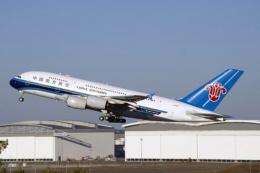A China Southern Airlines' Airbus A380 takes off at the Airbus delivery centre in Colomiers, southwestern France. The European Union will maintain its carbon tax imposed on airlines operating in its airspace, the Danish climate minister said, despite retaliatory trade measures by China.
The European Union will maintain its carbon tax imposed on airlines operating in its airspace, the Danish climate minister said, despite retaliatory trade measures by China.
As long as an international policy on carbon emissions by airlines is not found, the "EU will stick to its own ETS system", Martin Lidegaard said on Friday. Denmark currently holds the EU's rotating presidency.
The carbon tax imposed on airlines by the European Union came into effect on January 1, but carriers will begin receiving bills only in 2013 after this year's carbon emissions have been assessed.
The EU has says the tax will help it achieve a goal of cutting carbon emissions by 20 percent by 2020 and that it will not back down on the plan.
But more than two dozen countries, including China, Russia and the United States, have opposed the EU move, saying it violates international law.
The head of the Airbus parent company EADS said on Thursday that China has blocked purchases of Airbus planes by Chinese companies in reaction to the disputed tax.
"Airbus is subjected to retaliation measures," EADS chief executive Louis Gallois told a press conference as he presented annual results, adding: "The Chinese government rejects (refuses) to approve airlines' orders for long range airplanes."
The head of the International Air Transport Association (IATA) warned on Tuesday that the EU tax could provoke trade wars.
The EU argues that the cost for airlines is manageable, estimating that the scheme could prompt carriers to add between 4.0 and 24 euros ($32) to the price of a round-trip long-haul flight.
(c) 2012 AFP
























